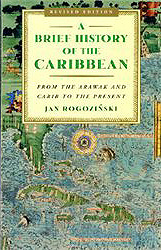Caribbean

Caribbean Ports: ° Anguilla ° Antigua and Barbuda ° Antilles ° Aruba ° Bahamas ° Barbados ° Cuba ° Dominica ° Dominican Republic (Santo Domingo) ° Grenadines ° Guadeloupe ° Haiti ° Jamaica ° Martinique ° Netherlands/Antilles ° Puerto Rico ° Saint Kitts ° St. Lucia ° St. Martin ° St. Thomas ° St. Vincent and the Grenadines ° Tortola ° Trinidad and Tobago ° Turks and Caicos
The Grenadines
Carib Indians aggressively prevented European settlement on St. Vincent until the 18th century. African slaves--whether shipwrecked or escaped from St. Lucia and Grenada and seeking refuge in St. Vincent--intermarried with the Caribs and became known as "black Caribs."
A Leeward Islands Carib Family
c. 1780
Agostino Brunias

Beginning in 1719, French settlers cultivated coffee, tobacco, indigo, cotton, and sugar on plantations worked by African slaves. In 1763, St. Vincent was ceded to Britain. Restored to French rule in 1779, St. Vincent was regained by the British under the Treaty of Versailles in 1783. Conflict between the British and the black Caribs continued until 1796, when General Abercrombie crushed a revolt fomented by the French radical Victor Hugues. More than 5,000 black Caribs were eventually deported to Roatan, an island off the coast of Honduras.
Slavery was abolished in 1834; the resulting labor shortages on the plantations attracted Portuguese immigrants in the 1840s and east Indians in the 1860s. Conditions remained harsh for both former slaves and immigrant agricultural workers, as depressed world sugar prices kept the economy stagnant until the turn of the century.
From 1763 until independence, St. Vincent passed through various stages of colonial status under the British.
September 28, 1844, Colonial Gazette, London, United Kingdom
London to wit,
Robert Wynne, late of the Island of Saint Vincent, and now of Barnes-terrace, in the county of Surrey, Esquire, saith as follows, he being informed that, notwithstanding the authentic declaration on the plans of the Islands of Saint Vincent and Dominica, signed by his Majesty's Commissioners, William Young, William Hewitt, Robt. Wynne, and John Byres the Chief Surveyor, doubts have arisen, and judicial proceedings been rendered thereby difficult, respecting the three chains round the seacoast u appropriated to the use of the contiguous planter," unless wanted to erect forts and batteries upon, in which case his Majesty may erect forts and batteries thereon without paying any compensation for the same; and also respecting the smaller spaces left unnumbered in the plans of the said islands, which are encompassed by lands sold to the contiguous planters; and he, the said Robert Wynne, being requested, as the only surviving Commissioner who was employed by the King in the disposal of the lands, to clear up the true nature and intent of those appropriations, in order to prevent disputes concerning them in future, maketh oath and saith as follows, viz., that the Commissioners being duly authorised by his Majesty's commission and instructions to dispose of his Majesty's lands in the ceded islands, and to make necessary appropriations thereof, did advertise and proceed to the first sale of plantation lots on the Thirtieth day of May, One Thousand Seven Hundred and Sixty-five, in Saint Vincent, the surveyors having been previously directed that three chains (sixty-six yards) be reserved/ or the King*s we from the sea along the coast; that, after the close of that day's sale, the purchasers represented to the Board of Commissioners that they had not adverted to the nature of the reservation of three chains for the King's use, but apprehended it was made for public use, to which they would not have objected, provided they whose land joined were to occupy it till required for public use. That a reservation for King's use would put it in the power of any ill-disposed Governor to give temporary grants for erecting posthouses, dramshops, and other pernicious purposes, to injure the adjoining property of those whose patriotism might lead them to oppose arbitrary and bad measures; arid that they would not abide by the sales, nor would gentlemen of fortune and spirit purchase at future sales, if that Condition was not altered.
The Commissioners, having considered the matter, complied with their desire: the condition was altered, public uses substituted in the diagrams in place of King's use, and resolved that the purchaser whose land joined the three chains should have the occupancy of them, unless wanted for forts and batteries. Under this alteration, avowal, and appropriation the sale next day, and all subsequent sales and disposal of plantation lots on-the seacoast of the said Islands of Saint Vincent and Dominica, were made. When the survey of all the coast of the islands aforesaid was made, and the plans completed and examined, the Commissioners further confirmed the appropriation by inserting thereon and signing as follows, viz.: We, his Majesty's Commissioners for the sale and disposal of lands in the new ceded islands, do certify, etc.: It is essential to remark that the smaller spaces left (in the plan) unnumbered, and which are encompassed by lands sold to the contiguous planters, are deemed uncultivable, and cannot otherwise be disposed of but to such planters, without materially injuring them, from the particularity of their situation they are therefore considered by us as appropriated to the use of the planter contiguous. The three chains round the coast are also considered by us as appropriated to the use of the contiguous planter, excepting in cases where any particular spot may hereafter be found necessary for erecting forts or batteries; in which case his Majesty may erect such forts or batteries thereon without paying any compensation for the same.

Signed, William Yong, William Hewitt, Robert Wynne. And this deponent saith that the smaller spaces unnumbered in the plans, and the three chains on the seacoast, were appropriated as above by his Majesty's Commissioners to the use of the contiguous planter, excepting in cases where a particular spot may be found necessary for forts and batteries.
ROBERT WYNNE.
Sworn the 20th day of October, in the year 1790, before me,
WILLAM PICKETT, Mayor.
Recorded and examined this 7th day of June, 1791.
A representative assembly was authorized in 1776, Crown Colony government installed in 1877, a legislative council created in 1925, and adult suffrage granted in 1951.
During this period, the British made several unsuccessful attempts to affiliate St. Vincent with other Windward Islands in order to govern the region through a unified administration. The most notable was the West Indies Federation, which collapsed in 1962. St. Vincent was granted associate statehood status in 1969, giving it complete control over its internal affairs. Following a referendum in 1979, St. Vincent and the Grenadines became the last of the Windward Islands to gain independence.


















 Copyright ~ 1998-2018.
Copyright ~ 1998-2018. 